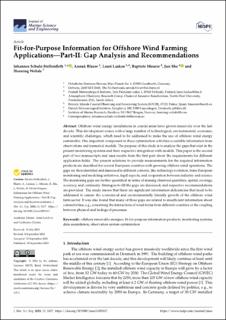| dc.description.abstract | Offshore wind energy installations in coastal areas have grown massively over the last decade. This development comes with a large number of technological, environmental, economic, and scientific challenges, which need to be addressed to make the use of offshore wind energy sustainable. One important component in these optimization activities is suitable information from observations and numerical models. The purpose of this study is to analyze the gaps that exist in the present monitoring systems and their respective integration with models. This paper is the second part of two manuscripts and uses results from the first part about the requirements for different application fields. The present solutions to provide measurements for the required information products are described for several European countries with growing offshore wind operations. The gaps are then identified and discussed in different contexts, like technology evolution, trans-European monitoring and modeling initiatives, legal aspects, and cooperation between industry and science. The monitoring gaps are further quantified in terms of missing observed quantities, spatial coverage, accuracy, and continuity. Strategies to fill the gaps are discussed, and respective recommendations are provided. The study shows that there are significant information deficiencies that need to be addressed to ensure the economical and environmentally friendly growth of the offshore wind farm sector. It was also found that many of these gaps are related to insufficient information about connectivities, e.g., concerning the interactions of wind farms from different countries or the coupling between physical and biological processes. | |
